- Home
- Newt Gingrich
To Try Men's Souls - George Washington 1 Page 3
To Try Men's Souls - George Washington 1 Read online
Page 3
With John Glover, the taciturn fisherman from the tempestuous New England coast, there was not the personal bond of affection that he felt had evolved between himself and Knox, but here was a doughty man he knew he could rely upon.
He had seen such weather often enough back home at Mount Vernon, the wind backing around to the east, clouds rolling up from the south, the broad Potomac tossed with whitecaps, temperature at first rising and then plummeting, as it now was.
The plan for tonight had been that by sunset the army would be mustered and already moved by individual columns of battalions to the points of embarkation. That plan had collapsed as the last rays of the sun were blanketed by the lowering clouds already lashing out with icy rain driving in from the east. The army was to have made its first move to concealed positions within a few minutes’ walk from the riverbank while it was still light. Some of the men were not yet out of their camps, and all semblance of an orderly preparation, which once darkness closed in was to have been unleashed by a fast rush to the boats and then across the river, was already falling apart. Now the far shore was an indistinct blur, waves kicking up midstream, ice floes crashing and bobbing as they swirled by.
The plan had been threatened with collapse even before it was supposed to start. Only now were troops beginning to move toward the river, and boats that should have been in place were still being maneuvered out of concealment. His hopes of bringing the boats alongshore at a dozen points for loading and then off-loading on the far shore were dashed by the rising of the river, tossed now with waves and blanketed with ice floes. Every single man, horse, and gun would have to be funneled to one narrow dock at the ferry and then off-loaded at an equally small dock on the opposite shore. Already it was obvious it would take twice, three times as long to complete the crossing.
A shiver ran through him.
A company of riflemen and several companies of his trusted Virginians, who would be the first to cross and establish a picket line, sloshed past him, kicking up icy slush. The riflemen at least had some semblance of uniforms, their famed round hats and fringed hunting jackets, long ago white, now filth-encrusted and stained to gray, brown, and black, patched and repatched; a lucky few still had boots or shoes, but many had burlap strips wrapped around their feet, and more than a few were barefoot. They did not see him standing in the shadows and passed in loose order, complaining and cursing.
“Damn this, damn all of this,” a voice echoed, and they staggered past, not recognizing their general in the shadows. “I tell you the captain said it’s off, he heard from . . . Come next week I’m going for home . . .”
“Just shut up and keep moving,” a deep voice boomed. “This is going to work.”
He marked with his gaze the last man in the column, a sergeant from the looks of him, someone who still believed and was urging his men onward.
The sergeant fell out for a moment to retie the burlap around his feet; obviously an older man, for in the fading light Washington could see his gray beard. He had the look of a man who, in spite of all privations, was as tough as seasoned hickory. Looking up as he finished retying his foot wrappings, the sergeant saw who was watching. He merely stood up, gave a casual salute, and without comment or flourish turned and pressed on, disappearing into the shadows and mists.
He could not help but smile. A time perhaps, he thought, when I looked like that. I was too young for a graybeard, but the hunting smock, loose leggings, a lean, strongman, moving with a casual ease that spoke of experience in the woods——that was once me.
Was it really twenty years past that he had marched with Braddock to that ghastly defeat near Pittsburgh? The years prior to that surveying the valley of the Shenandoah, venturing even as far as the Ohio. So many nights like this one, but huddled under a lean-to in winter storms, a good fire going, the day’s take of game roasting, there was no battle ahead to worry about, other than a concern that the natives might decide to change their views and pay a visit during the night. More than one of his comrades of those days had simply disappeared into the wilderness, a rumor perhaps drifting out later of a quick death in an ambush or a very slow and lingering death by torture.
Yet he had ventured westward as a young man, and at times still he dreamed of those days when he had gladly accepted the risks. That in part had been the thrill of it all. To explore land seen by only a handful of white men, to never know what he would experience around the next bend of the trail, to stake out more land in a day than an English baron could ever dream of owning.
Good days those, fine days. He could climb a ridge and see the unexplored world spread out before him, a vista stretching to eternity. Most of the English soldiers he knew in the last war had found the dark forests, the wilderness, disorienting, frightful even. They longed to return to England, its ordered fields, well-tended lanes, and teeming cities.
That was a difference between us so profound. Beyond the issues of the rights of free Englishmen, defined now as Americans, there was something deeper, harder to define, and the men who had just marched past him, echoing his own youth, perhaps symbolized it.
Beyond the Ohio he had explored in his youth there was the Mississippi. The few he knew who had seen it said the Ohio was merely a brook by comparison. And beyond that the Missouri, and beyond that river there were vague distant places that kings in Europe claimed were theirs but had never seen, and would trade back and forth as lines on a map, and mountains that supposedly dwarfed the Alps.
England could no longer rule this land; Englanders had no sense of it as we who were born to it did. They could never comprehend it unless they had trekked it for months at a time as he had. There was a time long ago when he had longed to travel to England, the motherland as some still called it, even invited there by comrades of old with whom he had served in the war against the French. But he knew now he never would, unless it was in chains to face a hanging. He grimaced at the thought, remembering what Ben Franklin had said about hanging together or hanging separately for what they now did. No, not the rope if we lose this night; they will not take me alive, and I will never surrender.
He turned to look back at the waters of the Delaware. Dark, foreboding. He knew those gathered nearby were waiting, most likely praying that he would end what they thought of as this mad venture. Knox had indeed said it outright earlier in the day with his booming voice, though his artillery chief did not know he was listening.
“It is one turn of the cards tonight, gentlemen,” Knox had said solemnly when he thought his General was beyond earshot, “and if trumped, it is the end for all of us.”
As the skies lowered and more and more men turned to look upward, muttering that it was going to be a blow, he could sense their wavering. But there was no turning back. The army was at a ragged end. Enlistments of all but a handful expired at the beginning of the new year, but six days off. An army once thirty thousand strong on the day independence was proclaimed had collapsed to a pitiful frozen few. He could muster five thousand tonight. In days it might only be five hundred.
That is why I cannot turn back, he thought, though common sense tells me that I should. My instinct tells me we have no choice. It is not for mere symbolism that I chose “victory or death” as our password for this night. It is a gamble, but it is the only gamble we can take.
The plan was well-nigh impossible to execute even by a professional fighting force trained to it for years, as were the English and even more so the Hessians, the finest professional soldiers to be had in Europe.
His army was to cross in three parts, his main force here, nine miles north of Trenton; a second, diversionary force at Bordentown, downriver from Trenton; and then, just before dawn, a third force directly below the town to block any escape by the garrison they planned to attack at first light. Even if, by some strange device, he could speak instantly to the commanders of his other two forces and monitor each step of their moves, even then such an attack at night was a challenge near to overwhelming, as he knew almost all of hi
s staff believed.
The men were poorly fed, many having wolfed down the three days of so-called rations within minutes after receiving the leathery beef and hardtack. The march this night would be a hard one on ice-covered roads, which by the feel of this storm would soon turn to slush and semifrozen mud. Of the five thousand reported as present, the surgeon’s report this day declared barely half fit for duty, and a night of hard marching would most likely mean hundreds of them collapsing before dawn. And that report had been given before this storm rolled in.
Dr. Benjamin Rush, an old friend, had come up from Philadelphia several days ago to visit and inspect the army. Congress as usual was looking over his shoulder even though in a proclamation of two weeks back, after fleeing Philadelphia for Baltimore, they had all but given him dictatorial powers to recruit a new army and command it. He trusted Rush, though, and welcomed him. Rush was a man of optimism and encouragement who swore that in spite of the unrelenting defeats a new spirit was beginning to rise up in defiance.
“Perhaps we Americans need a good thrashing now and again to wake us up,” Rush had said.
He could not reply to that, for he was the commander who had been thrashed, and soundly. From Long Island all the way across New York and New Jersey to the Pennsylvania side of the Delaware, he had been beaten in every stand-up fight, and now, as his army lost morale and men, he was reduced to a final desperate act.
He had shared with Rush his plan to somehow strike back before the end of the year, to achieve some victory that would boost morale and in turn encourage at least some of the men to stay with the colors and renew their enlistments. The comment had been made that it would be “victory or death,” and those three words, at that moment, had not in the least sounded like a line delivered by an actor upon the stage.
Of course, he loved plays.
Like all soldiers, he could not help but smile when the play was about war, and great heroics were enacted. When the first volley struck into Braddock’s column in 1755, dropping scores of men instantly, there had been no pause in which Braddock could deliver a speech. That was no thimbleful of stage blood when a musket ball smashed into the face of the man next to him. It was easy enough for an actor to cry out, “Victory or death,” but now, at this moment?
He had told Rush there would be no alternative on this night. If he flinched from the weather and the risks, from the difficulties and the enemy, the collapse in morale would lead his army to disintegrate. Within a week there would no longer be an American army. Then death would be his fate and the fate of every leader of the Revolution.
Victory or death. If the Hessians were forewarned, aroused, and awaiting them in full battle array, he would lose. Of that he had no doubt. His men hated, loathed the Hessians after the reports of their bayoneting of prisoners and wounded at Long Island and Manhattan. They feared them as well for their clocklike precision, discipline, and frightful ability to pour out four volleys a minute to the two ragged volleys of his “Continental line,” and as for the militia, they barely knew how to load their weapons, let alone fire them in a disciplined manner. If the Hessians were waiting and deployed, what was left of his army would be pinned to the east bank of the Delaware and then overwhelmed by the British garrison, warm and well fed, pouring down from Princeton.
He looked up at the dark sky and found himself wondering if he would ever see home again.
Martha and Mount Vernon? What of them?
She would survive, he prayed. The English were not savages; in fact, it was tragic in a way that they faced each other now like this. For they were of the same blood. The Howe brothers were gentlemen and would not take vengeance on the widow of a slain enemy. But Mount Vernon? It would be confiscated as a prize of war, and Martha would be turned out to live off the charity of friends, at least those friends who had stayed Loyalist and thus still held their property.
He had written her that afternoon, confided in her how much he missed her and how he longed to be home in their wonderful place looking out over the Potomac. He had not confided that his men were cold and hungry, his army losing courage, their situation reduced to this last, desperate lunge. He had promised to write her on the morrow and reminded her of the love he felt in the depths of his being. He had said winning this war was vital to him, not only for America and freedom, but because it would let him go back home to the cherished companionship of the one whom he loved more than life itself. He thought briefly of Martha by the fire down in Virginia and shook his head. Time now only to decide, act, lead, arouse, and impose. Time now to show the Hessians and the British what kind of people they were trying to enslave.
Another gust of wind roared in across the river, coming more from the northeast, driving a gale of frozen rain. The moon was up, visible in the gaps that momentarily appeared in the scudding clouds. But the western horizon beyond the hills bordering the river was now obscured as well, and what little light there was seemed to be extinguished, like a candle snuffed out, and the world went dark.
The far bank disappeared from sight. The wind howling across the river now was a steady blow, treetops swaying and crackling as the icy rain froze to branches and then shattered.
Damn, it was so damned cold.
He pulled his cape in tighter and turned to face Knox.
“Start them across,” he announced.
He could barely make out the features of his chief of artillery, who was tasked this night with commanding the crossing of the river.
Knox was one of the few men in this world whom he actually had to look up to.
For a few seconds, Knox looked into his trusted friend’s eyes. Nothing needed to be said; the time to debate was over. Knox saluted, turned, and started down to the ferry dock.
“We’re going!” he bellowed. “Start loading up.”
No one moved. He could sense their disbelief that he was pressing forward in an enterprise that most all of them believed to be a forlorn hope.
Washington forced a smile. “Just keep telling them the Hessians will be asleep. What awaits them in Trenton will be warm shelter, hot food, and dry boots for the taking.”
Even the words sounded wooden to him. Merciful God, are we so pathetic in this endeavor that I must motivate men by the promise of dry shoes taken from the enemy?
He could see the response in their eyes as they circled around him. Knox was aflame, as was Greene, but the others?
They would be facing the Hessians come dawn, and nearly all in the rank and file feared them.
“It is time to pay them back, gentlemen. Pay them back for the humiliations dealt to us. Tonight will be our night. Now to your duties.”
The group slowly began to break up except for Knox, who stormed off, shouting orders, his voice booming above the thunder of the storm.
The Hessians. Mercenaries. My God, how could those who were once our own countrymen do this, hire a foreign army to trample down our liberties? Yes, they had aroused the ire of his army, when first sighted, but now all they did was arouse fear. For they were the best disciplined infantry in the world and the most relentless on the battlefield.
His spies had told him whom he would face. A Colonel Rall. He had glimpsed him on the battlefields at Fort Washington and White Plains. Fearless, and rumor was, one of their best.
Am I a fool to think that these frozen men around me, ragged, barefoot, already soaked through, will face and defeat Rall in the morning?
Or was all hope of surprise already lost? Rall was a professional, his intelligence reports saying he was a man with thirty years’ experience in war. And at this moment he and his men were warm, well fed, and resting.
He felt a dark premonition and pushed it aside. By dawn, he would face Rall, and it would be the German commander who would take the sword from his dying hand.
He turned back to watch the men beginning to file past.
“Close up the ranks, boys, and keep moving. Remember, it is victory or death.”
CHAPTER TWO
Tren
ton, New Jersey
6:00 P.M., December 25, 1776
Colonel Johann Rall leaned back in his chair, gazed at his host with a contented grin, and moved his black checker over his opponent’s last survivor, thus winning the game.
There was a friendly laugh from his host, Mr. Potts, who had so graciously offered his home as headquarters for, as he put it, “our allies in the suppression of treasonous rebels.” Shaking his head, Potts stood up, went to the sideboard, and held up a decanter filled with wine.
“You are too good an opponent,” Potts announced, gesturing with the decanter as an offer to refill the colonel’s glass.
“No, sir. Duty. I must not drink much,” Rall replied with a smile.
He felt that his English was awkward, though he had been practicing ever since his prince had informed him, nearly a year ago, that his regiment would be sent to the Americas to help “our English cousins” against this peasant rebellion sweeping their colonies.
Potts, who could speak some German, made a second offer of just a bit more to celebrate this Christmas night, and Rall again refused, this time in German as well.
It did not stop Potts from refilling his own glass before returning to sit across from the colonel, motioning to the checkerboard, offering to set up another game.
Rall nodded and Potts began to reset the pieces.
Rall was glad to find a fairly decent competitor in this game. Like any gentleman he could play a good round of chess, but on a night like this he preferred a game that required far less concentration, that he could play casually while he dwelt on other concerns.
The wind outside continued to rise, windowpanes and closed shutters rattling. One of the shutters, breaking free and swinging out and then slamming back, sounded almost like a musket shot. Old soldier that he was, he tried not to show a reaction to the sharp sound, but it did cause him to look over with a start.

 1945
1945 Collusion
Collusion Trump's America
Trump's America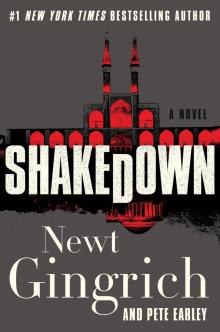 Shakedown
Shakedown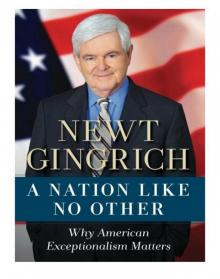 A Nation Like No Other
A Nation Like No Other To Try Men's Souls - George Washington 1
To Try Men's Souls - George Washington 1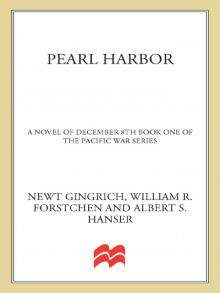 Pearl Harbor: A Novel of December 8th
Pearl Harbor: A Novel of December 8th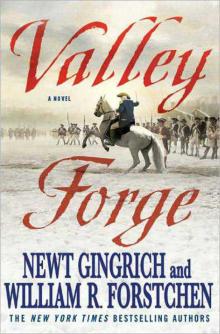 Valley Forge: George Washington and the Crucible of Victory
Valley Forge: George Washington and the Crucible of Victory To Save America
To Save America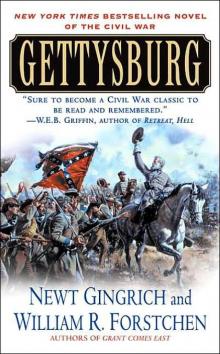 Grant Comes East cw-2
Grant Comes East cw-2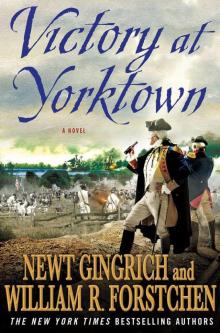 Victory at Yorktown: A Novel
Victory at Yorktown: A Novel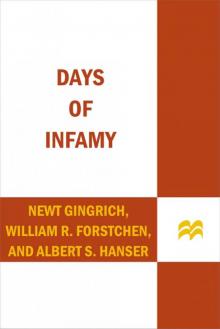 Days of Infamy
Days of Infamy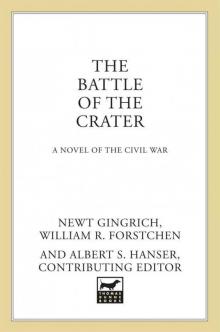 The Battle of the Crater: A Novel (George Washington Series)
The Battle of the Crater: A Novel (George Washington Series)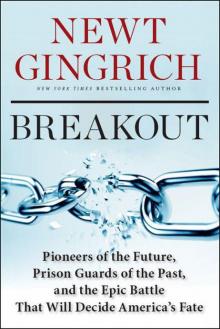 Breakout: Pioneers of the Future, Prison Guards of the Past, and the Epic Battle That Will Decide America's Fate
Breakout: Pioneers of the Future, Prison Guards of the Past, and the Epic Battle That Will Decide America's Fate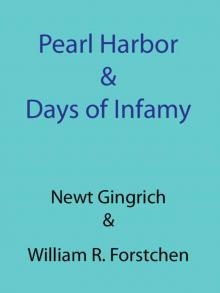 Pearl Harbour and Days of Infamy
Pearl Harbour and Days of Infamy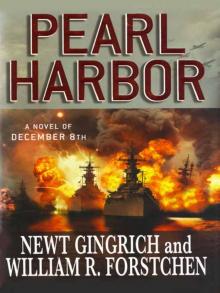 Pearl Harbour - A novel of December 8th
Pearl Harbour - A novel of December 8th Understanding Trump
Understanding Trump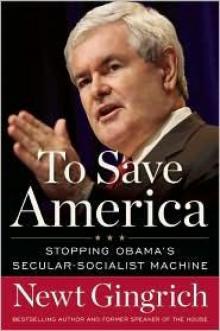 To Save America: Abolishing Obama's Socialist State and Restoring Our Unique American Way
To Save America: Abolishing Obama's Socialist State and Restoring Our Unique American Way